STEP-BY-STEP Writing, Book 1: A Standards-Based Approach, Second Edition - Linda Lonon Blanton 2008
Unit 9 Tell a Story
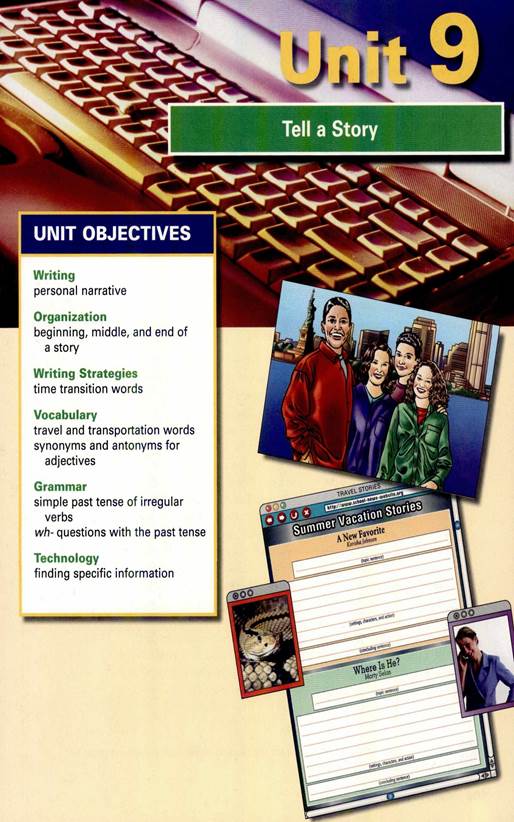
Reading
![]() Discuss. Plan a trip with a partner. Answer the questions. Present your travel plans to the class.
Discuss. Plan a trip with a partner. Answer the questions. Present your travel plans to the class.
1. Where are you going to go?
2. When are you going to go there?
3. Who are you going to go with?
4. How are you going to get there?
□ train □ bus □ car □ other
5. What are you going to do?
□ go sightseeing □ go to a museum □ buy souvenirs
□ visit friends or family □ other
6. Why do you want to go there?
![]() Read. Read about the Garcia family's trip to New York City.
Read. Read about the Garcia family's trip to New York City.
Our New York Adventure
Francisco Garcia
My family took a trip to New York City last summer. We visited my mother’s friends, Mr. and Mrs. Vega. We were very excited before we left. It was our first trip to New York. We flew to New York on Sunday morning. The weather was clear and sunny. The airplane was very comfortable. We arrived at about 3:00 p.m. Mr. and Mrs. Vega met us at the airport. We stayed with Mr. and Mrs. Vega for one week.
We didn’t have much free time during our visit to New York. We were busy. On Monday, we took the train to Long Beach. We swam and ate watermelon. The next day, we took a ferry and saw the Statue of Liberty. The view was amazing. We had an exciting time. However, one day was especially exciting for Maria. On Friday, we went sightseeing. First, we took a subway into the city. Later on, we took a bus to Central Park. The bus was very crowded. We got off the bus at the park. However, something was strange. Maria wasn’t with us. We looked around and finally we saw her. Maria was on the bus! She didn’t get off. There were too many people. My father ran after the bus. At last, the driver stopped and Maria got off. In the end, Maria was safe. She was very careful on buses and trains after that.
We came back to Los Angeles the next day. Mr. and Mrs. Vega drove us to the airport in their car. We got home late Saturday evening. We were exhausted, but we were happy. We had a wonderful time in New York. However, Maria is never going to forget her scary bus trip.

![]() Write captions. Write a sentence from the reading under each picture on page 107. Use sentences from the passage.
Write captions. Write a sentence from the reading under each picture on page 107. Use sentences from the passage.
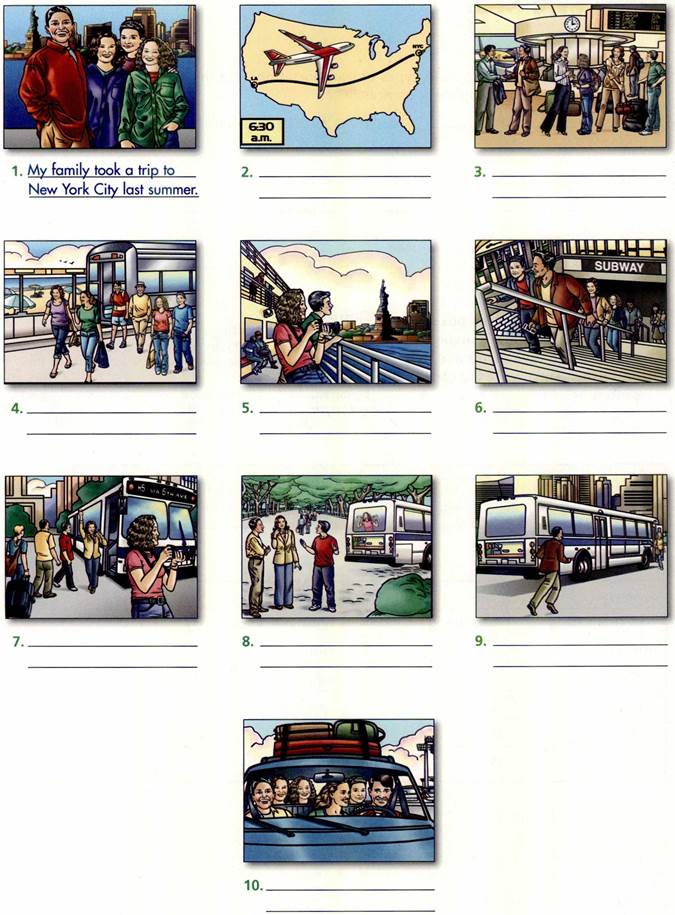
Vocabulary
![]() Unscramble the letters to make types of transportation. Find the words in the reading on page 106. Write the complete sentences.
Unscramble the letters to make types of transportation. Find the words in the reading on page 106. Write the complete sentences.
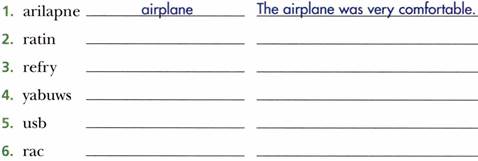
![]() Find the words from the box in the reading on page 106. Complete the chart with the synonyms and antonyms. Then write the complete sentences.
Find the words from the box in the reading on page 106. Complete the chart with the synonyms and antonyms. Then write the complete sentences.
Remember!
Synonyms are words that have the same (or close to the same) meanings. Antonyms are words that have opposite meanings. Good writers use different words to make their writing interesting.
![]()
careful
amazing
exciting
safe
exhausted
strange
wonderful
comfortable
clear
crowded
scary
sunny


![]() Reread the passage on page 106. Then match these words to make travel phrases.
Reread the passage on page 106. Then match these words to make travel phrases.
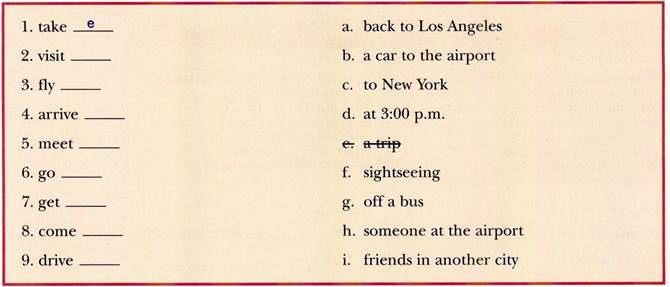
Grammar
> Learn more in the Grammar Reference, pages 131-141
![]() Write the past tense form for each irregular verb. Then find each verb in the reading on page 106. Write the complete sentence.
Write the past tense form for each irregular verb. Then find each verb in the reading on page 106. Write the complete sentence.
Simple Past Tense of Irregular Verb
Verb |
Affirmative |
Negative |
take |
They took a trip to New York. |
They didn't take a trip to San Francisco. |
fly |
We flew to New York. |
They didn't fly to Portland. |
meet |
They met us at the airport. |
They didn't meet us at the bus station. |
1. take took
2. are …
3. is …
4. fly …
5. meet …
6. swim …
7. eat …
8. see …
9. have …
10. go …
11. run …
12. come …
13. drive …
14. get …

![]() Complete the questions with the correct forms of the verbs in parentheses. Answer the questions. Use information from the reading on page 106.
Complete the questions with the correct forms of the verbs in parentheses. Answer the questions. Use information from the reading on page 106.
Wh- Questions with Past Tense
Present Tense |
Past Tense |
Where does the Garcia family take their summer trip every year? Why do they go there? How do they get there? Who do they visit there? What do they see there? When do they come home? |
Where did the Garcia family take their summer trip last year? Why did they go there? How did they get there? Who did they visit there? What did they see there? When did they come home? |
1. (go) Where did the Garcia family go? They went to New York City.
2. (get) How … they … to New York City?
3. (eat) What … they … at Long Beach?
4. (get) Where … Francisco … off the bus?
5. (run) Why … Mr. Garcia … after the bus?
6. (go) Who … the Garcia family … to the airport with?
7. (come) When … they … home?
![]() Complete the paragraph. Use the past tense of the verbs in parentheses. There are regular and irregular verbs.
Complete the paragraph. Use the past tense of the verbs in parentheses. There are regular and irregular verbs.
The Garcia family (1. take) took a trip to New York City. They (2. fly) … to New York on Sunday. They (3. arrive) … at 3:00 in the afternoon. Mr. and Mrs. Vega (4. meet) … them at the airport. They (5. not have) … a lot of free time in New York. They (6. swim) … at Long Beach. They also (7. see) … the Statue of Liberty. On Friday, the Garcia family (8. go) … to Central Park on a bus. The Garcia family (9. get) … off the bus. However, Maria (10. not get) … off. In the end, Maria (11. is) … safe. The Garcia family (12. come) … home on Sunday. Mr. and Mrs. Vega (13. drive) … them to the airport. They (14. are) … exhausted, but happy after their trip. They (15. have) … a wonderful time in New York.
Organization
Beginning, Middle, and End of a Story
Find the beginning, the middle, and the end of the passage on page 106. Write two sentences from each part of the story in the chart below.
Remember!
Stories have a beginning, a middle, and an end. The beginning introduces the story and tells about the setting and characters. The middle gives details about the action or plot of the story. The end tells what the story means or why it is important.
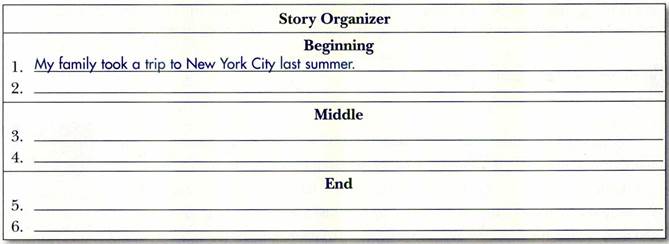
Writing strategies
Time Transition Words
Add the correct time transition word or phrase to each sentence. Use information from the reading on page 106.
Remember!
Transition words help to connect ideas. Time transition words tell the reader the order of events in a story. Look at how time transition words can change the meaning of a sentence.
Zhi studied after he ate lunch.
Zhi studied before he ate lunch.
during
at last
later on
before
in the end
after that
the next day
finally
1. The Garcia family was very excited before the trip.
2. They didn’t have a lot of free time … their visit to New York.
3. On Monday, they took a train. …, they took a ferry.
4. On Friday, they took a subway to the city. …, they took a bus to Central Park.
5. After they got off the bus, they looked for Maria. …, they saw her.
6. Mr. Garcia ran after the bus. … the driver stopped.
7. …, Maria was safe.
8. Maria was very careful on buses and trains …
Writing
Personal Narrative
A personal narrative tells a story from the author's point of view. It uses the first person (/, my, me, we, our, us). It also has a beginning, a middle, and an end. In a narrative paragraph, the topic sentence introduces the story. The supporting sentences tell about the setting, characters, and action. The concluding sentence ends the story and tells what it means. Travel stories and journal entries are examples of personal narratives.
![]() Read. Read the stories about trips.
Read. Read the stories about trips.
My family took a trip to San Francisco last July. My mother, my sister Bethany, and I visited my aunt and uncle. We took a train from Portland, Oregon to Oakland, California. Oakland is a city near San Francisco. We left on Wednesday morning. We were on the train all day. It was amazing. We saw a lot of beautiful mountains and trees during the trip. However, we arrived very late that night. We were exhausted. We got off the train, but something was strange. My uncle was not at the station. My mother was really worried. Finally, my mother’s cell phone rang. It was my uncle. He was at the Emeryville station. We were at the Oakland station. He was at the wrong station. He drove quickly to the Oakland Station. We were really happy to see him. In the end, our trip was fantastic. We’re going to go again next year. I hope my uncle goes to the correct station next time.

I had an interesting trip last July. My mother, father, brother, and I went to a new zoo downtown. My father drove us to the zoo. It was very close to our home. We walked around the zoo after we arrived. We saw many animals. Some animals were beautiful. Some animals were funny. I really liked the snakes. I thought they were fascinating. My brother didn’t like them. He thought they were scary. Later on, we watched an animal show. During the show, the zookeeper gave me a snake! I held it for five minutes. It was really heavy, but it was beautiful. Later on, my brother held the snake, too. Now, he doesn’t think they are scary. They are his new favorite animal. In the end, we all had a good time at the zoo.
![]() Find the author. Reread the paragraphs.
Find the author. Reread the paragraphs.![]() the topic sentence in each paragraph. Underline the supporting sentences. Make a
the topic sentence in each paragraph. Underline the supporting sentences. Make a![]() around the concluding sentence. Then, write each paragraph under the correct name and title on page 113.
around the concluding sentence. Then, write each paragraph under the correct name and title on page 113.
Personal Narratives
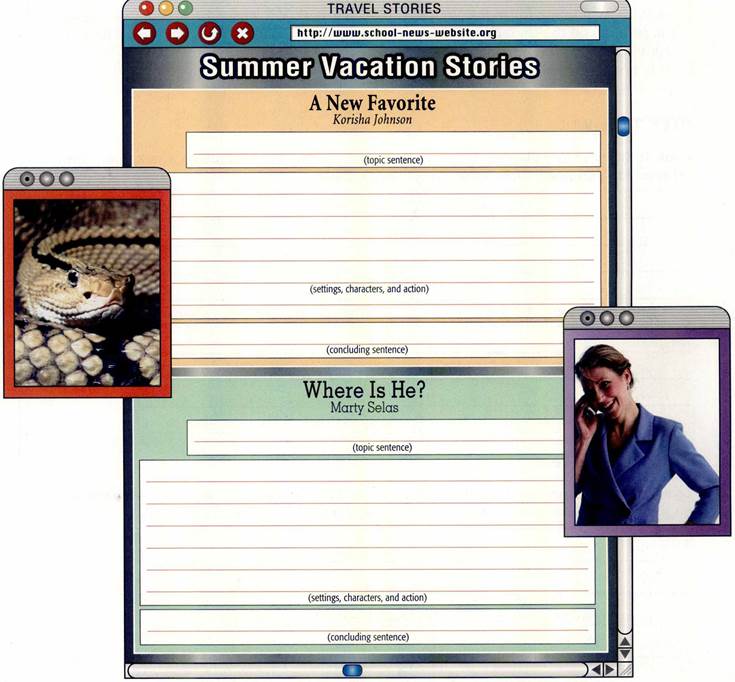
Step-by-step writing
Purpose: Tell a Story
Writing PROMPT
Tell a story about a trip you took. Write a personal narrative paragraph for a class Web site. Describe the setting and the characters. Describe the action. Use transition words to connect ideas. Be sure your story has a beginning, a middle, and an end.

STEP 1 Pre-write
Look at Marty's story planner. Copy the chart or make one on a computer. Think about the information you need. Write notes for your paragraph.
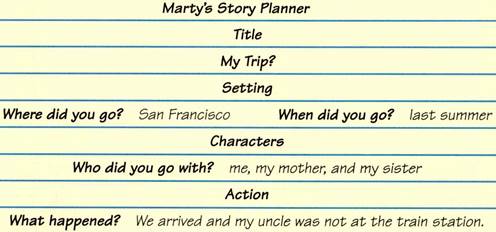
STEP 2 Organize
Look at Marty's story organizer. Organize your ideas. Copy the story organizer or make one on a computer. Complete the story organizer with information about your story.

![]() Practice. Look at Marty's first draft. How can he improve it? Answer the questions.
Practice. Look at Marty's first draft. How can he improve it? Answer the questions.
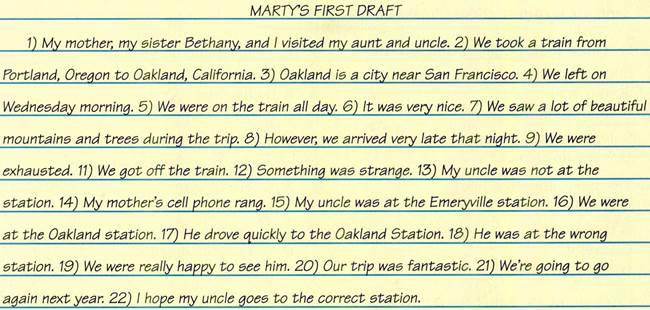
1. Which topic sentence should Marty insert before sentence 1?
A My trip.
В I went to San Francisco.
© My family took a trip to San Francisco last July.
D San Francisco is a city.
2. How can Marty change sentence 6 to make it more interesting?
A It was terrible.
В It was amazing.
C It was OK.
D It was exhausting.
3. What two sentences are not in the correct chronological order?
A Sentence 13 and Sentence 14
В Sentence 14 and Sentence 15
C Sentence 16 and Sentence 17
D Sentence 17 and Sentence 18
4. What time transition should Marty insert in sentence 20?
A Before,
В Finally,
C In the end,
D During,
![]() Draft. Write a first draft of your narrative paragraph. Use your notes from Steps 1 and 2.
Draft. Write a first draft of your narrative paragraph. Use your notes from Steps 1 and 2.
![]() Revise. Read your first draft. How can you improve it? Look at the revision checklist. Revise your writing.
Revise. Read your first draft. How can you improve it? Look at the revision checklist. Revise your writing.
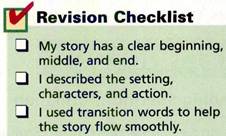
Step 4 Edit
![]() Practice. Look at the sentences. Choose the best substitute for the underlined words. If the sentence is correct, choose "Make no change."
Practice. Look at the sentences. Choose the best substitute for the underlined words. If the sentence is correct, choose "Make no change."
1. My family took a train to Chicago last summer.
A took train
В drove a train
C flew a train
Ⓓ Make no change.
2. The scary movie was bright.
A cloudy
В frightening
C careful
D Make no change.
3. Later on, we eat lunch at a new cafe.
A eats
В did ate
C ate
D Make no change.
4. We didn't swam on our trip.
A doesn’t swam
В didn’t swim
C doesn’t swim
D Make no change.
5. Where do you go last weekend?
A Where do go
В Where did you go
C Where you go
D Make no change.
![]() Edit. Reread your draft from Step 3. Look at the editing checklist. Edit your writing.
Edit. Reread your draft from Step 3. Look at the editing checklist. Edit your writing.
![]() Peer Edit. Exchange drafts with a partner. Tell your partner what you like about the draft. Look at the editing checklist. Tell your partner how to improve the draft.
Peer Edit. Exchange drafts with a partner. Tell your partner what you like about the draft. Look at the editing checklist. Tell your partner how to improve the draft.
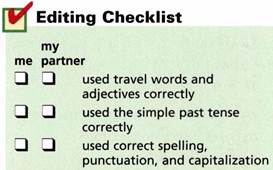
STEP 5 Publish
Rewrite your paragraph in your notebook or on a computer. Present your paragraph to the class. Who has the most interesting story? Why is it interesting to you?
Finding Specific Information
![]() Do an keyword search for "Statue of Liberty" and "visitor information." How do you get there? When is it open? Write down the hours of Liberty Park and how much the ferry ride costs. Cite your source. Then find visitor information for an interesting place in your city.
Do an keyword search for "Statue of Liberty" and "visitor information." How do you get there? When is it open? Write down the hours of Liberty Park and how much the ferry ride costs. Cite your source. Then find visitor information for an interesting place in your city.